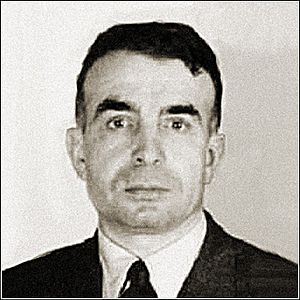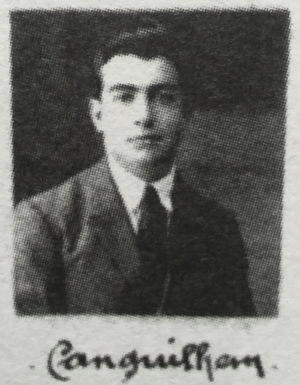Georges Canguilhem facts for kids
Quick facts for kids
Georges Canguilhem
|
|
|---|---|
 |
|
| Born | 4 June 1904 Castelnaudary, Aude, France
|
| Died | 11 September 1995 (aged 91) Marly-le-Roi, Île-de-France, France
|
| Alma mater | École Normale Supérieure, University of Paris |
| Era | 20th-century philosophy |
| Region | Western philosophy |
| School | Continental philosophy French historical epistemology Anti-positivism |
| Doctoral students | Michel Foucault, Gilbert Simondon |
| Other notable students | François Dagognet |
|
Main interests
|
History and philosophy of science, historical epistemology, philosophy of biology, philosophy of medicine |
|
Notable ideas
|
Revival of vitalism, dispositif |
|
Influences
|
|
|
Influenced
|
|
Georges Canguilhem (4 June 1904 – 11 September 1995) was a French philosopher and doctor. He focused on epistemology, which is the study of knowledge. He also studied the philosophy of science, especially biology.
Contents
Life and Early Career
Georges Canguilhem started at the École Normale Supérieure in 1924. This was a famous school in France. Other well-known thinkers like Jean-Paul Sartre were in his class. After finishing school, he taught in high schools across France. While teaching in Toulouse, he also began to study medicine.
In 1941, he started working at the University of Strasbourg. He earned his medical degree in 1943. This was during World War II. Canguilhem joined the French Resistance to fight against the occupation. He used the secret name "Lafont" and worked as a doctor in Auvergne.
Later Career and Influence
By 1948, Canguilhem was the head of the philosophy department at Strasbourg. Seven years later, he became a professor at the Sorbonne. He also took over as director of the Institute for the History of Sciences. He held this important job until 1971. Even after retiring, he stayed active in his field.
In 1983, he received the George Sarton Medal. This award is given for important work in the history of science. In 1987, he got the gold medal from the Centre national de la recherche scientifique (CNRS). This is a top French research award.
Ideas on Biology and Medicine
Canguilhem's main ideas about science are in two books. One is Le Normal et le pathologique (The Normal and the Pathological). It was first published in 1943 and later expanded. This book explores what "normal" means in medicine and biology. It also looks at how medical knowledge is created. This work is still very important in understanding medical history. It greatly influenced Michel Foucault, another famous philosopher.
His second major book is La Connaissance de la vie (Knowledge of Life), published in 1952. In this book, Canguilhem studied what makes biology a special science. He also looked at vitalism, which is the idea that living things have a special life force. He believed that living organisms are more than just machines. He argued that we should not think of them only as parts that can be put together. Instead, we should see them in relation to their environment. He thought organisms successfully adapt and survive in their surroundings.
Canguilhem criticized the idea of reducing biology to just physics and chemistry. He felt this would ignore what makes living things unique. He believed it would turn living beings into simple mechanical structures. This would not explain the complexity of life. He continued these ideas in his later book, Ideology and Rationality in the History of the Life Sciences.
At first, Canguilhem did not like the ideas of Henri Bergson or vitalism. But later, he was influenced by them. He then developed his own unique version of vitalism.
Mentoring and Legacy
Canguilhem was one of the few philosophers who also had a medical education. This helped him create a very careful way of studying the history of science. He focused on concepts like "normal" and "pathological." He also studied how scientific ideas, like the "reflex," developed over time.
He was also a mentor to many French scholars. One of his most famous students was Michel Foucault. Canguilhem supported Foucault's important work, History of Madness. He continued to follow Foucault's work throughout his life.
As a top official in philosophy education, Canguilhem had a huge impact. He helped shape how philosophy was taught in France for many years. Many famous thinkers, like Jacques Derrida and Louis Althusser, respected him greatly. Althusser once said his debt to Canguilhem was "incalculable."
After many years, a lot of Canguilhem's writings have been translated into English. These include his famous books The Normal and the Pathological and Knowledge of Life. There are also collections of his essays, like A Vital Rationalist and Writings on Medicine.
See also
 In Spanish: Georges Canguilhem para niños
In Spanish: Georges Canguilhem para niños


